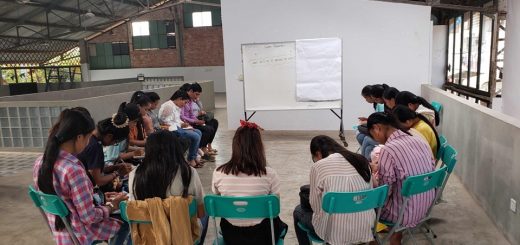Sebastien in Davos – Part One ‘Training and Employing Youth – Looking To The Future’
The World Economic Forum (WEF) is held in the tiny Swiss town of Davos in chilly January each year. The movers and shakers of the economic world meet there, along with Heads of State, cultural ambassadors and others to discuss the economic state of the globe and look for innovative approaches to tackling the most pressing economic issues of our time. Schwab Foundation for Social Entrepreneurship, who are part of the organization of the WEF, invite leading social entrepreneurs to this event, to share their expertise on a global platform. Our own Sebastien Marot, Executive Director of Friends-International, is a regular visitor to the WEF. His journey there this year proved to be an eventful one – several delays, lost luggage and a few freezing days dressed in clothing more suitable for a Cambodian summer! However, normal service has now been resumed as he got his luggage back…
In this piece, originally written for the Schwab Foundation/WEF web blog, he talks about the principal subject he will address at the WEF this week – the growing issue of youth unemployment, and how to tackle it using models developed by Friends-International…
‘I’m heading off to the World Economic Forum in Davos to talk about training of young people, to me a major challenge that will have profound impacts upon the world we live in if we do not address it properly. This places it at the heart of our work at Friends-International.
Youth unemployment is rising dramatically across the world – 75 million are affected: a rate of unemployment 3 times higher than for adults! 10% of these are categorized as NEET (Not in Education, Employment or Training). With little improvement in sight, there are heavy consequences: immediate negative economic and social effects, long term effects on employability and trust.
A key challenge identified is quality and relevance of training to market needs. To address this issue, Friends-International runs vocational trainings as businesses: restaurants, beauty salons, garage, etc. By respecting market logic, we developed an extremely successful model that ensures skills are in tune with market needs, that the market and employment are available, that training is of best quality and that youth are immediately employable and productive. In addition, profits generated by running businesses ensure that the trainings are self-sustainable and any additional profits can be used to support social services.
However, quality of training is not enough: these young people need jobs. Social enterprises like us cannot solve that issue alone and need to build partnerships with both the corporate sector and Governments. In the recent year we have developed some promising collaborations with corporations that include technical support for vocational training (ensuring quality and adequacy with actual employers’ needs) or internship for youth. With one corporate partner, we went a step further, setting up a vocational training hotel: it will be run as a business, staffed by students, supervised by teachers. These trainees will then be employed either by this company or others. Such collaborations need to be developed more, covering different economic sectors.
The current economic situation, however, calls for intervention by, and collaboration with, Governments: supporting overall improvements in vocational training to match market needs and be competency based, finding solutions to reduce barriers to employment, pushing for job-growth policies and investments and encouraging fiscal and macro-economic policies supporting youth employment.
It is only together, social actors/corporate sector/Governments, that we can address the issue of youth unemployment and prevent major social crises unfolding in the near future, while also supporting our common development and global peace.’







